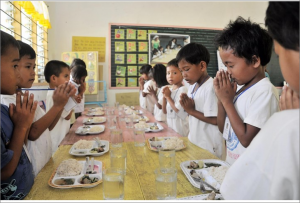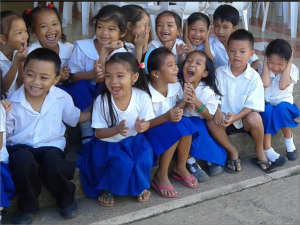

to be served.
A total of 192,927 children in Western Visayas availed of the government’s feeding program.
These 3 to 5 year-old children that enrolled in the day care centers, get a full meal for 120 days that is implemented by DSWD in partnership with Local Government Units.
The government has invested more than P300 million for the program. These could help the children improve their physical aspect such as body & health so that they will not be sick and hungry while they are at young age.
“Through the program, we will be able to help curb the hunger’’, said Diana Alcantara, DSWD nutritionist.
Last 2017, DSWD6 targeted number of children beneficiaries in Western Visayas per province. In AKLAN-13,135; ANTIQUE-21,386; CAPIZ-17,829; GUIMARAS-4,415; ILOILO-61,442; and NEGROS OCCIDENTAL-74,720. The actual number of children beneficiaries served for the said year are as follows; AKLAN-13,687; ANTIQUE-24,059; CAPIZ-19,695; GUIMARAS-5,045; ILOILO-63,553; and NEGROS OCCIDENTAL-72,251.
Through this DSWD SF got the 97% financial accomplishment that shows exactly how the agency gives importance and attention to the children beneficiaries.
Also, In the Province of Capiz, the Municipality of Sapian Feeding Program has contributed much to the program implementation of the agency. They organized sets of officers who are responsible to ensure the program operations.
According to Ma. Theresa L. Aguilar Focal Person of Municipality of Sapian, different committees were created on food preparation, cooking, marketing, deworming and weighting.
“Day Care parents were oriented of proper food preparation/handling and sanitary practices to ensure that the children will eat clean and healthy food,”she said.
“Parents were also encouraging to maintain vegetable and herbal garden in their day care centers for them to have fresh vegetables to cook during their feeding, this will also teach the parents on proper work orientation thriftiness and prepare cheap but nutritious food for their children,” she finally said.
Moreover, Supplementary Feeding Program is implemented in response to the 2006 Family Income and Expenditure Survey (FIES) conducted by the National Statistics Office which should that 11 percent of Filipino families had income that cannot buy the food needed by family members for nutritional well-being and health. These families can be considered as hungry and food poor. Along with Pantawid Pamilyang Pilipino Program, KALAHI-CIDSS or Kapit Bisig Laban sa Kahirapan-Comprehensive and Integrated Delivery of Social Services and Sustainable Livelihood Program, Supplementary Feeding seeks to achieve Millennium Development Goal No. 1, which is eradicating extreme poverty and hunger./ Joanna Rose C. Jabonete/DSWD6
